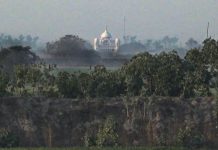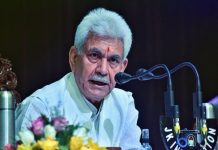Modi said what his captive audiences loved to hear. In Kolkata, before chambers of commerce, and in New Delhi, at a speech organised by Network 18, a media company, Modi held forth on how he had cast his lot for small government — though not by cutting down the size of bureaucracy (not only do clerks and their families vote, they also supervise elections). Although, within minutes, he contradicted himself by suggesting his government had indeed sacked workers from municipalities who, he quickly insisted, had found jobs in the private sector.
It was instructional that Modi, as much a carrier of neocon bromides as a Hindutva poster boy, struggled to dodge a direct question on the need for “labour reforms”, an industry euphemism for hire-and-fire, that the moderator, Raghav Bahl, put to him. When Bahl said, without a touch of irony, that India was a “right of centre society” and told Modi that government was intruding into all public life inhibiting it sorely, Modi said, “It isn’t as bad as you make it sound.” Who would have imagined there could be someone to Modi’s right too?
Of course, in his speeches Modi has not needed to pander to Hindu sectarianism for those credentials are already strongly established. He skipped any reference to Muslims and other minorities. Ditto for the divisive Babri Masjid-Ramjanmabhoomi campaign in Ayodha. (By contrast, Advani, who is struggling to stay politically relevant, revived the long dormant topic by telling the party faithful in Delhi he was proud of his role in the movement that ended with Hindu zealots razing the mosque in 1992.) But even Modi could not help slip in, perhaps subconsciously, an oblique reference to the RSS’ revisionist history of India: before the FICCI ladies in New Delhi and with the industrialists in Kolkata, he mentioned “1,200 years of servitude (ghulami)”, no doubt referring to the period of Muslim rule over parts of India since the late 11th century which secular historians have always held as indigenous governments but which right-wing Hindu outfits have always projected as alien rulers. Similarly, Modi played to the wider Hindu gallery by referencing to Mother India and Swami Vivekananda.
At the same time, Modi’s speeches were full of over-simplifications and not a few contradictions. While he indicted the culture of centralisation that he said pervades governance across the country and stressed repeatedly the need for a devolution of powers and decentralisation, he let out that when industrialists come to his state to buy land to set up industry, he counsels them himself on how to approach the farmer whose lands they eye. “Don’t go meet the farmer in a big car,” Modi said he tells the industrialists. “Don’t wear a coat and pants.” Surely he can trust his officers to do such counselling?
Certainly, it would seem Modi is fully convinced of his manifest destiny as his party’s top candidate for the prime minister’s job. In none of his speeches he made any reference to Advani, and spoke only thrice of Atal Bihari Vajpayee, the only prime minister from the BJP. (Although Modi, apparently carried away, referred to the “eight-to-nine years” of Vajpayee’s rule. Vajpayee was PM for six years until 2004.) Neither in New Delhi and nor in Kolkata did he refer to the newly installed party president, Rajnath Singh, who only last month inducted Modi into the party’s top decision- making body, its parliamentary board.










